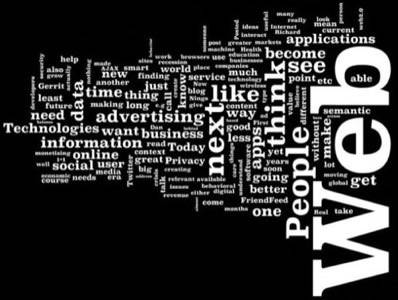Over the weekend we editorialized that the world financial crisis will have a big impact on where Web Technology is headed. Has the world arrived at one of those giant inflexion points, we asked, where one Web era is usurped by another? We asked you to leave a comment in the post telling us what you think will be next. Many of you did just that and also the post was fortunate enough to get to the digg frontpage, where it received 100 additional comments. Finally, we polled our friends on Twitter today and got many great replies.

This is an attempt to synthesize, analyze and categorize all of the responses from RWW, digg and Twitter. What is next after Web 2.0? Read on!
Technical Advances
Jason Palmer claimed that XMLHttpRequest and AJAX drove web 2.0. He thinks that “the next wave will come once HTML 5 and CSS 3 are fully supported on all popular browsers. This will, again, give developers more toys to play with, and expand the boundaries of entrepreneurs.”
Likewise a commenter called Joseph suggested “moving away from HTML and onto more advanced, more flexible technologies; otherwise it’s not worth it.”
Guy Bendov wrote that “better bandwidth & stronger CPU tell me that it will be about “multi media galore”. More Flash and Silverlight apps and much more video.”
Webjay creator and ex-Yahoo Lucas Gonze is not convinced the financial crash will cause a generational turnover, however he said that “if I had to bet, it would be that located computing will become a huge factor. “
Sumeet predicts “productivity apps (that save time), PaaS and WiMax+utility computing as delivery.”
Liz optimistically suggested a “Web Vista”.
Digg user Mankrik had an amusing take on tech advances: “Web 3.0 will enable us to punch web developers who abuse flash and bad site layout THROUGH the screen.”
Word cloud of the comments from the original post, via wordle.net

Semantics & Personalization
Will The Semantic Web ever arrive? Several commenters were optimistic…
Mark Johnson, Powerset/Microsoft Program Manager, commented that “the next era of the Web will represent greater understanding of computers.” He went on to suggest that “if Web 1.0 was about Read and Web 2.0 was about Read/Write, then Web 3.0 should be about Read/Write/Understand.” Specifically he said that “a computer that can understand should be able to: find us information that we care about better (e.g., smart news alerts), make intelligent recommendations for us (e.g., implicit recommendations based on our reading/surfing/buying behavior), aggregate and simplify information. . . and probably lots of other things that we haven’t yet imagined, since our computers are still pretty dumb.”
Dan from Web3Beat wrote that we’ll see improvement in personalization, by which he meant “machine understanding/retrieval of user context via a mix of Machine Learning and smart metadata technologies that are able to parse out context in a way that today 2.0 apps cannot”. He also mentioned “user-driven opt in data (+portability)” and “monetizing data, versus monetizing pages”.
Aziz Poonawalla said “folksonomy, leveraged en masse, could render algorithmic search obsolete. you get Semantic web almost for free.”
ajkohn2001 thinks that “Microformats are a pre-cursor for how the semantic web will deliver information”, pointing to Mozilla’s Operator app (“a microformat detection extension”) as an example.
Damien Basile reckons we will move to an “intuitive web”, whereby “instead of being so literal the web will give me tangental possibilities”.
The Hard Problems in The Real World
Tim O’Reilly, whose company coined the term ‘web 2.0’ in 2004, has been lately pushing for developers to tackle the hard problems of the world. Here are some suggestions from our readers on this theme…
Education is one area ripe for Web innovation. Harley of WorldLearningTree recently submitted his suggestions on how to revolutionalize online education to Google’s “Project10ToThe100” contest.
Sandra Foyt is looking for a “better learning/connecting hub”. She elaborates: “I want a command center where it’s easy to share all kinds of digital media, while being able to chat or microblog. An all in one home base, with Twitter/Flock/Ning/Wiki/Flickr/YouTube elements.”
Influential VC Fred Wilson pointed to a post from his venture firm recently, which was on the theme of the Web shifting power to individuals. Fred noted that “we are particularly interested in “disrupting and improving” education and energy markets”.
Jorge Escobar said that the next era will be “Web Real World” – by which he meant “offline activities driven by web services (geoloc, mobile, niche)”.
Jeff Tupholme wrote: “Web connects back to real world, helping save money on energy, recycle & share physical goods, create local markets etc. for mainstream”.
Ari Herzog thinks that web 2.0 still has much work to do: “As long as the world remains backlogged on universal broadband access, as long as poverty exists in families and villages that the digital divide remains in vogue, and as long as cellphones are not widespread in developing nations, the concept of Web 2.0 is not going anywhere anytime soon.”
Privacy & Security Issues
Privacy and security have been hot issues in the web 2.0 era, but they will become even more important in the next – as education, health and other ‘real world’ apps take center stage…
Gerrit Eicker predicted that “behavioural advertising will get into trouble” due to privacy issues. He also noted that “the Cluetrain Manifesto turns 10 years soon: We’ll see a broad discussion about its impact. What’s been achieved? What’s outdated? Why and what hasn’t become part of our lives, businesses, and markets?”
Tara Kelly of privacy app Passpack echoed Gerrit’s concerns, saying that “Health care, education and finances are all *very* important issue to tackle, but they require a substantial level of data privacy in order to protect people from abuse.”
barefootmeg said that “security is going to become an increasing concern, especially wireless security.”
Business Models & Revenue
Of course while they’re busy changing the world, entrepreneurs need to also pay their own rent or mortgage. Here is the feedback we got on business models beyond web 2.0…
Wes commented that it’s up to entrepreneurs to “make things people are willing to pay for … your ability to rely on credit to grow or experiment is limited by a general lack of confidence.”
Ben Ruedlinger of online video app Wistia says that we will see “a shift towards companies building web applications which are creating real business value within the enterprise. This means either reducing operating costs or increasing revenues.”
Rich Chetwynd of online training solution Litmos says that “the future of the web lies in finding ways outside of advertising to monetize user generated content.”
Ben Young forsees “startups powered by 1-4 people, ultra small niche to dominate in, started for under $20k”.
Robert Sterling tweeted that the financial crisis will lead to “dislocation of large chunk of US workforce & turbo-charging of indie work-for-hire and affiliate mrktg workforces.”
Over on digg, ralphthemagi had some criticism of current web business models – calling the user-generated content model “You produce, we profit.” He explained: “That is the driver behind Web 2.0. Basically, you can get people to *do work* (in most cases, creating content) for free, and then profit from their work by either charging them to do work, or selling your workforce advertising, or both. Of course, the “profit” part doesn’t always pan out, but that’s the goal.”
Consumer & Communications
Consumer web apps dominated the Web 2.0 era. We’ll continue to see improvements in the next era, we’re sure. Here is what our readers thought on that front…
Dr. Taly Weiss sees web 2.0 being “enhanced” to help people deal with the global financial crisis: “People’s life are about to change. Those people are active online. They will use the web to address their needs.”
Bruce suggested we will see “more mashup type applications where people can entertain themselves and interact, but we should also see more useful apps with mashups so they can accomplish tasks more efficiently”.
Paul Christian (‘Fletch’) sees the rise of a “non-elitist web and community of people who will make up [an] 8th mass media”.
abhy hopes to see “more collaborations between websites. Nowadays everyone are on their own, it would be great to see more of services like www.admatchup.com or other banner exchange solutions, even in fields other than advertisements.”
John McCrea forsees the walls coming down “and a new open stack (OpenID, OAuth, Portable Contacts, XRDS-Simple, OpenSocial, microformats) enables seemless interoperability, with users in control.”
mark dunst said: “The web will follow the user. Folks will have central control of all their info (ex. health), media and converstations”
Wilson Craig said “The eradication of the fixed workplace and the complete disintermediation of information. Doing away with major networks, newspaper”.
Rob Inskeep suggested “meta of content, communities of trust to validate UGC, creative commons privacy for UGC. Communities of relationships, not ‘things'”.
International & Mobile
Two trends of the current era are the increasing internationalization of the Web and mobile products like iPhone and Android becoming more prominent. It almost goes without saying that both of these things will become more prevelant over the coming years – and indeed both depend on the other…
Kumar pointed out that internalization of the Web is yet to peak: “Countries like India are yet to get fully connected.When at least 30 % of South Asia gets on to the Internet (right now it is like 2-3% at best), it is going to drive a lot of internet economy.”
andi1984 said “the next step to Web 3.0 would be a mobilization of web-apps (e.g. iphone).”
John Metta of positorio.us said “location-aware networking. Apps such as @shizzow blending with rapid publish like @posterous to provide local content and interaction.” He explained further that we can expect a “single interactive experience that changes 4 me not with app’s location, but MY location.”
Cory O’Brien expects “a convergence of data where you can put information in one place but access it through many other places and in many other ways”.
Darren Sharp is looking forward to “augmented reality via mobile devices [and] serious location-based services.”
Conclusion
The jury is still out on whether web 2.0 has officially ended. Of course the Web is iterative and so version numbers don’t really mean anything. But even so we may see more of a focus on ‘real world’ problems from now on and a move away from consumer apps as the primary focus.
As always, please leave your thoughts in the comments.
Top image: adactio

















